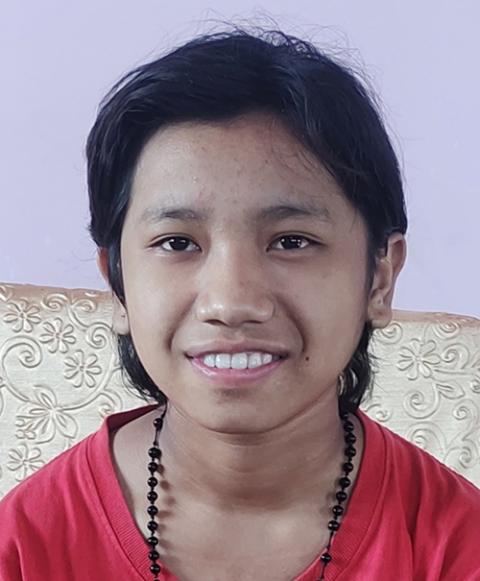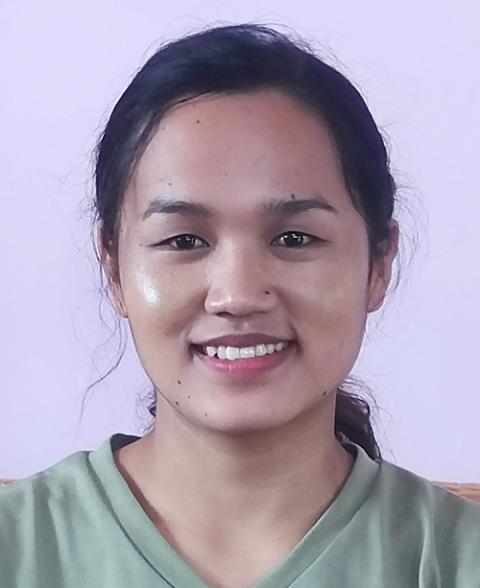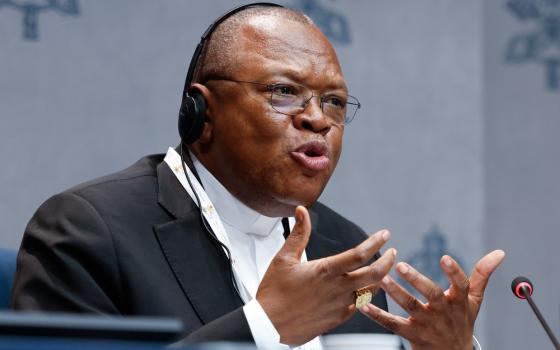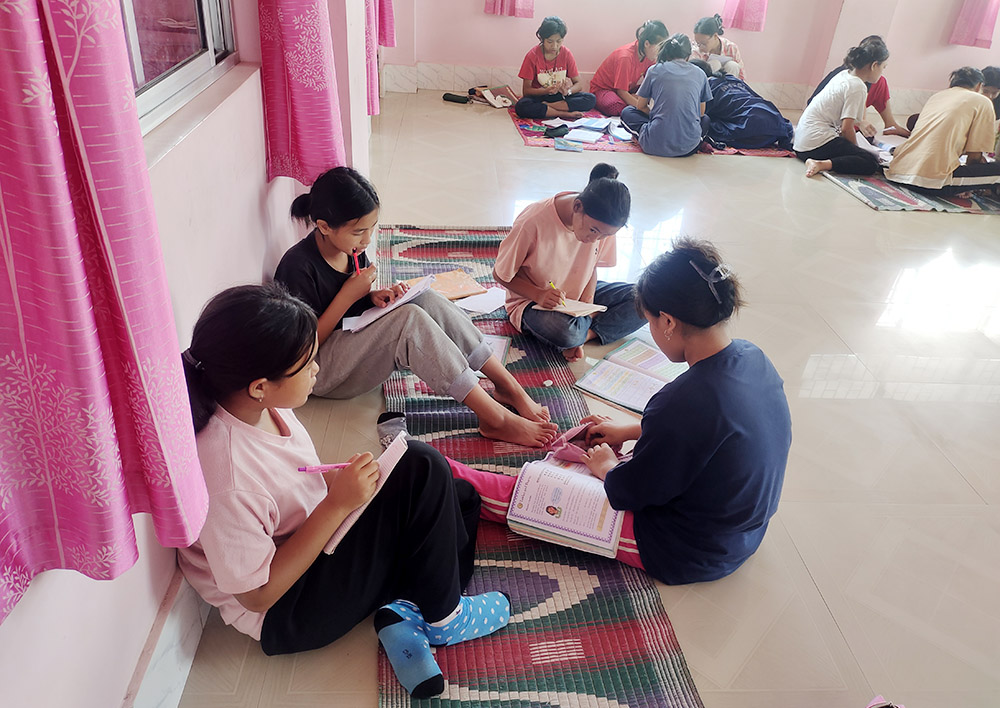
Older girls study with the younger ones at Snehabhavan ("Home of Love"), a girl's orphanage managed by Salesian nuns in Imphal, capital of the troubled Manipur state in northeastern India, after ethnic violence led to the closure of their school. (Thomas Scaria)
Laughter and singing reverberated through a girls orphanage in the northeastern Indian state of Manipur, as violence raged on the streets outside.
"Not that we are not affected by the violence, but we feel safe and secure here," Anjali Khouchung, a 12-year-old resident of Snehabhavan ("Home of Love"), told Global Sisters Report.
The ethnic violence in Manipur, which began May 3, is a conflict between the Meitei community, who are Hindus and the majority community of the state, and the Kuki, a minority tribe who are mostly Christians. Nearly 200 civilians, mostly Kukis, were killed in the violence. Many churches and villages were also burned.
The violence was still raging when GSR visited the Manipur capital of Imphal the last week of September.
The state government had cut off the internet but, presuming the situation had improved, restored it after four months — only for it to be disconnected again as fresh violence hit Imphal following social media rumors about the murder of two students of the Meitei. The state government also reimposed indefinite curfew in Imphal, the capital city.
"Our sisters take good care of us here," said Khouchung, a member of the Naga, a minority tribe in Manipur that is not involved in the conflict.
The sisters had to send the Kuki students back from their Imphal center for security reasons, as the majority community of Meiteis were targeting Kukis, but sisters continued to take care of the orphaned Kuki children in refugee camps through their outreach programs.
Snehabhavan is among 29 centers in India supported by "Homes of Hope," an international organization of volunteers. These centers, spread across India, provide a safe home and new life for hundreds of orphaned, abandoned or trafficked girls.
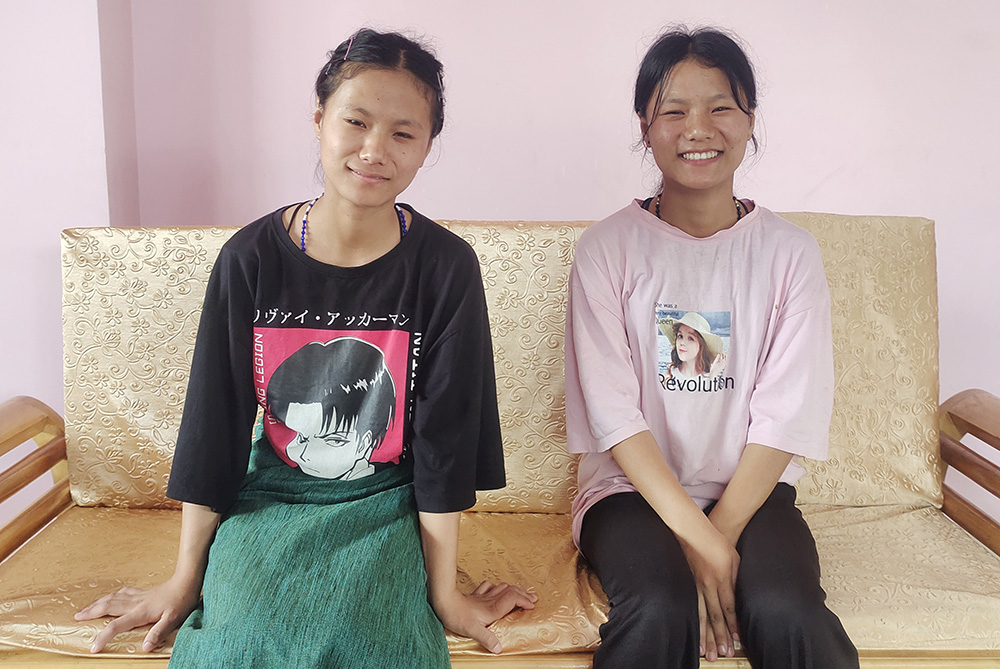
Melody and Gracy Mariamme, identical twins residing in Snehabhavan at Imphal, said they would not have "anything to hope for" had they not arrived at Snehabhavan. The 17-year-old 10th graders joined Snehabhavan after their parents died when they were in the second grade. "We lost our parents while we were too small. We want to become doctors or nurses to treat such people," said Gracy, who studies in a local school with her sister. (Thomas Scaria)
Salesian Sr. Tresa Karottukunnel, the Snehabhavan director, said her congregation started the orphanage three decades ago in a Meitei-dominated area near the Imphal airport, to provide a home for women and children in difficult situations.
"We are saddened at the continuing violence in Manipur," the 67-year-old nun — popularly known as Sister Karot — told GSR at her convent in Imphal.
She said they had to "painfully send back our Kuki children after the riots erupted."
The Indian army escorted those children to safer locations and handed them over to their relatives. "Others are really scattered, some stay with their relatives, some live in relief camps and others are taken care of by other sisters," Karot explained.
Advertisement
Though the sisters are unable to accommodate those orphaned by the conflict, they reach out to them in camps and settle some children with other centers outside Manipur.
Eight Kuki girls were admitted to another Home of Hope Center, managed by Holy Spirit Sisters in Mizoram, a neighboring state.
The Homes of Hope centers were founded by an American philanthropist couple, Paul and Tracy Wilkes. In India, the organization works with eight women religious congregations: the Salesians, Congregation of Mother Camel, Franciscan Clarists, Holy Spirit, St. Anne, Holy Cross, Jesus Mary Joseph and Missionary Sisters of Mary Help of Christians.
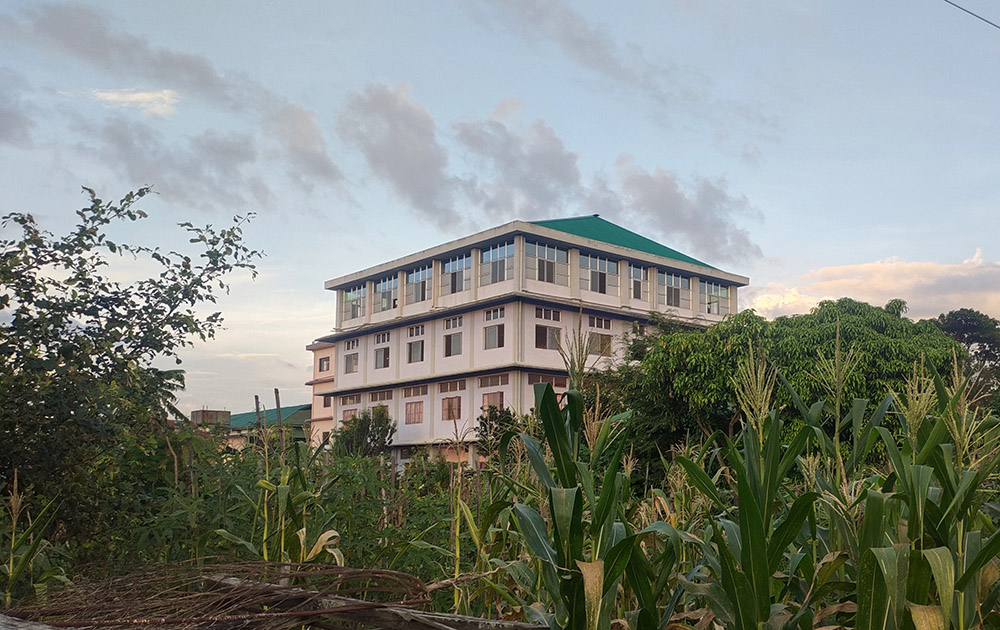
The new building of Snehabhavan in Imphal, capital of Manipur state in northeastern India, built by Homes of Hope (Thomas Scaria)
Today, the centers support orphanages, schools and empowerment centers throughout India. They serve the abandoned, orphans with AIDS, the disabled, survivors of sexual exploitation, marginalized tribes, and victims of domestic bonded slavery and communal riots.
Khouchung said she misses her Kuki friends. "We pray for their safety every day. Some are in touch with us through video calls whenever the internet works," she added.
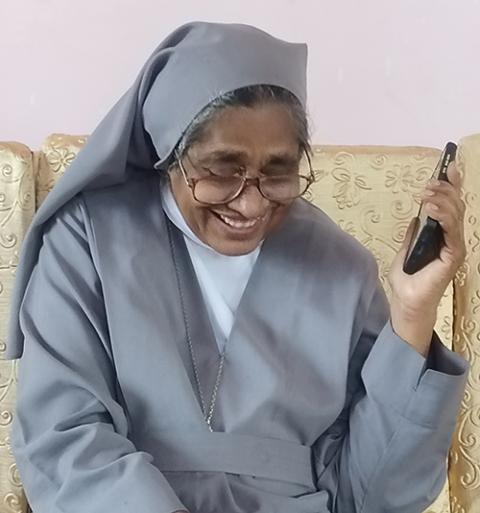
Salesian Sr. Tresa Karottukunnel speaks to a former resident of Home of Hope at Imphal, India. (Thomas Scaria)
Karot said Khouchung is "a daughter of Snehabhavan," as she was born and brought up there. Her mother, a substance addict, gave birth to her in the foster home managed by the nuns and left her there.
Khouchung calls Karot her bobok ("grandmother" in the Manipuri language). "My mother left me, but my bobok takes care of me, and I have nothing to fear," she said.
Equally grateful to the nuns is Beena Kumari, who works with sisters in a drug rehabilitation center for women in the Snehabhavan campus. She, too, had lost her parents as a child and grew up with the Snehabhavan nuns.
The 26-year-old nurse, a Meitei Hindu, told GSR that she owes much to the Catholic nuns for giving her "love, hope and education."
Karot said parents of many girls in Snehabhavan had died of substance abuse or HIV/AIDS. "We have been running a short-stay home for such victims, and many children were referred from there," added the nun, who now plans to settle Kumari in marriage.
Snehabhavan has also sheltered two brothers. Although the center has not admitted boys for the past several years, the boys continue to reside on campus: one as the nuns' driver and the other as an office boy.
Samson Chithung, 22, the younger sibling, told GSR that the center adopted them when they were children and educated them and found them jobs. "Now, we want to give back what we have received to our community," he said.
The brothers accompanied GSR to the nearby St. Paul's Church in the campus of Catholic Pastoral Training Institute in Sangaiprou, a suburb of Imphal city, which the Meitei mobs torched May 4.
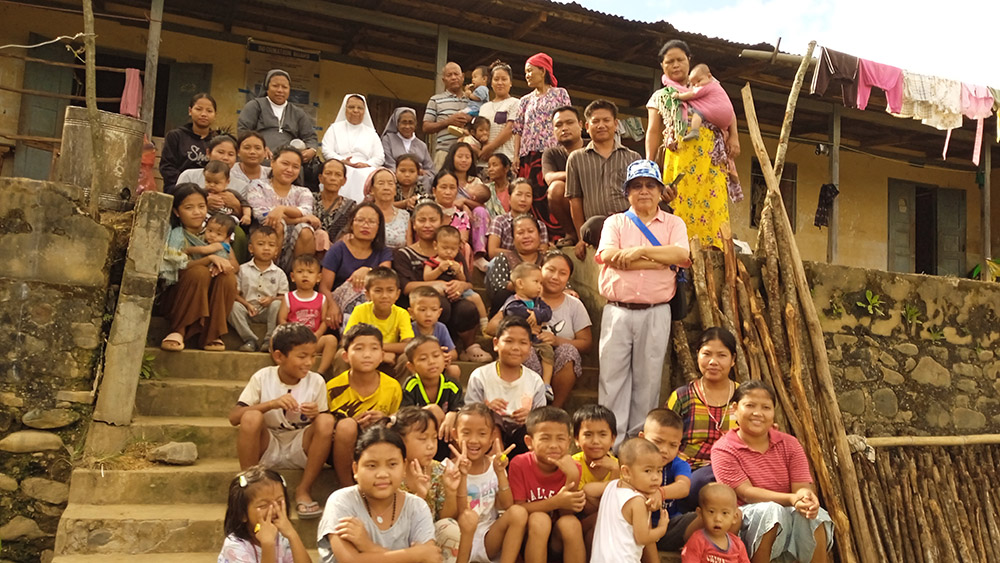
Salesian sisters with children residing in a temporary relief camp at Churachandpur in Manipur, where Homes of Hope distributed relief materials. In the back row, starting second from left, are Srs. Annie Inchenat, Maria Dilbung and Tresa Karot. (Courtesy of Tresa Karottukunnel)
"Initially, we tried to place our children in other safe locations outside Manipur, but they were adamant to stay back, saying they were ready to die together," said Panackakuzhy, whose center takes care of orphans and children affected by HIV/AIDS.
Mercy Home children study in a school across the main road managed by the congregation. "But, for the students' safety, we have hired a bus to transport them," Panackakuzhy said.
Besides the children, the nuns accommodate a few families with disabled members in their campus.
"Many villages are now empty, and they have no idea when and where they can return from the camps," she said.
Panackakuzhy and Karot, though from different congregations, conducted a survey to find out what people needed, and frequently visit the relief camps to provide donated essential goods.
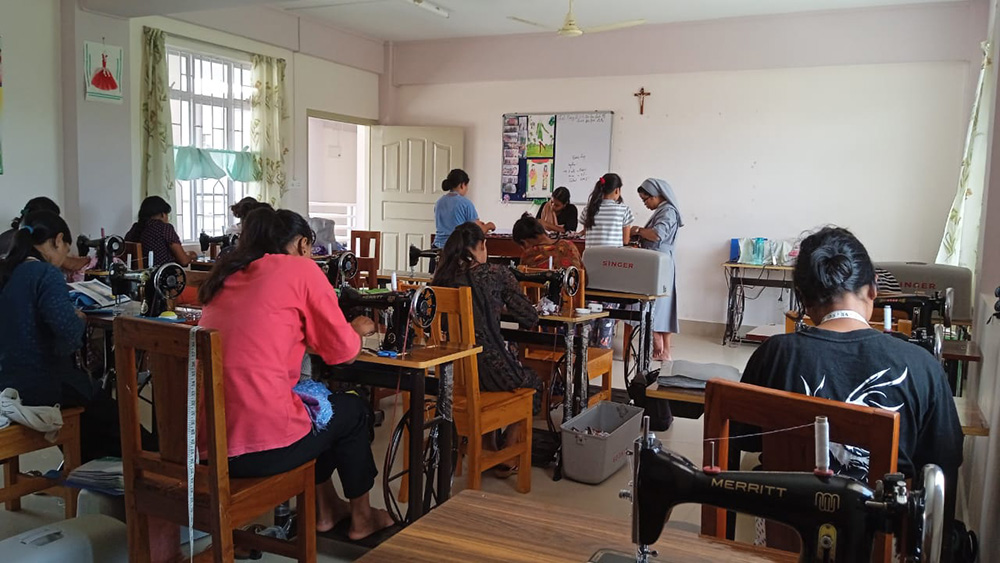
Salesian Sr. Jubil Maria, who directs Auxilium Skills Training Center, trains rural women at Shillong, capital of the northeastern Indian state of Meghalaya. (Courtesy of Jubil Maria)
Homes of Hope also supports the nuns' Auxilium Skills Training Center that shelters abandoned women and provides them skills training.
Salesian Sr. Jubil Maria, who manages the training center, told GSR that they conduct a three-month diploma program with a government-prescribed syllabus for village women.
"Homes of Hope has sponsored our training center and the hostel, and the Meghalaya government supports us with the running cost," said Maria, who has managed the center since 2010.
She said they could train more than 4,000 women, mostly poor and dropouts, in tailoring, fashion designing, computer, beauty and housekeeping.

Some residents of Pratyasha Bhavan at Fort Kochi in Kerala, India, with their clinical psychologist, Nithya Inchikalayil. (Thomas Scaria)
Salesian Sr. Eugine Labore, who heads the congregation's media division, said the Wilkes met their sisters in 2006 at Pratyasha Bhavan (Home of Hope) in Kochi, in the southwestern Indian state of Kerala. The American couple took the English name of the Kochi center for their support organization.
Pratyasha Bhavan now accommodates more than 30 orphans, and two Kuki women from Manipur.
Anjela Chinneikim, a Kuki woman in Pratyasha Bhavan, told GSR that she had to run away from Manipur as her two cousins were raped and killed by the rioters. "The sisters are supporting me to overcome my trauma and fear," she said.
Sr. Rosily Theckanath, superior of the convent that runs Pratyasha Bhavan, told GSR that their orphanage in Fort Kochi was the birthplace of "Home of Hope."
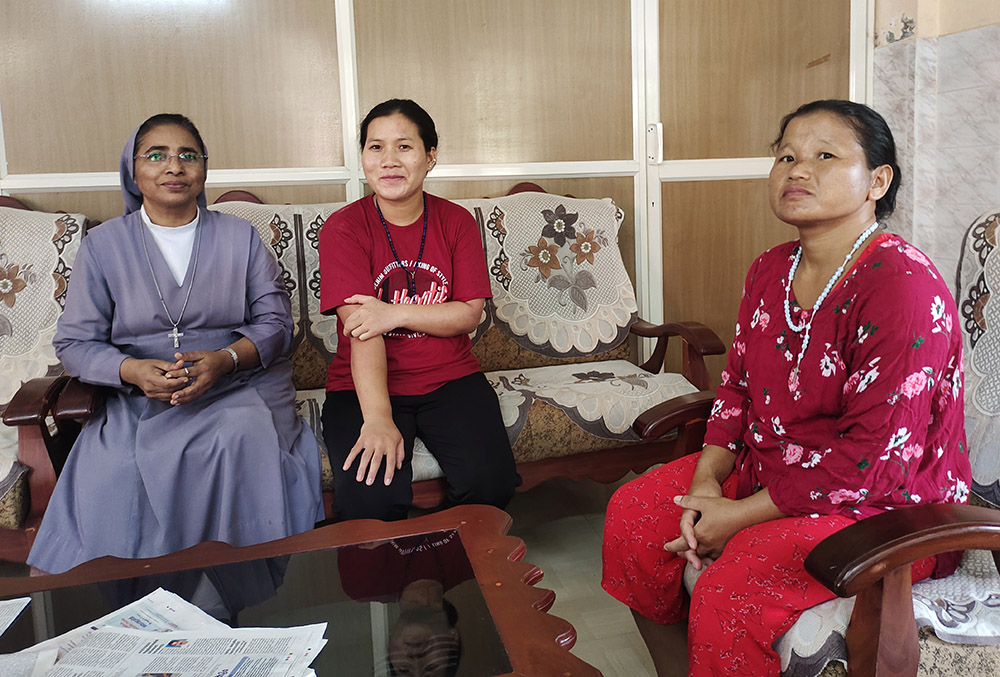
From left: Salesian Sr. Anita Joseph; Anjela Chinneikim, a Kuki woman who is living in Pratyasha Bhavan at Fort Kochi, India; and Salesian Sr. Rosily Theckanath (Thomas Scaria)
"One of our children, Reena, caught the touring couple's attention, and they visited Pratyasha Bhavan," Theckanath recalled.
Reena was blinded in one eye by a beggars' mafia. "But her one radiant eye inspired one of the greatest movements in volunteerism and humanity," the nun said.
Today, Reena is married and has a 2-year-old son.
"Our aim is to ensure every girl in our homes get integrated into society as productive citizens, and stand by themselves with a job and family," said Sr. Anita Joseph, Pratyasha Bhavan director, while showing an album of girls settled in life with families.
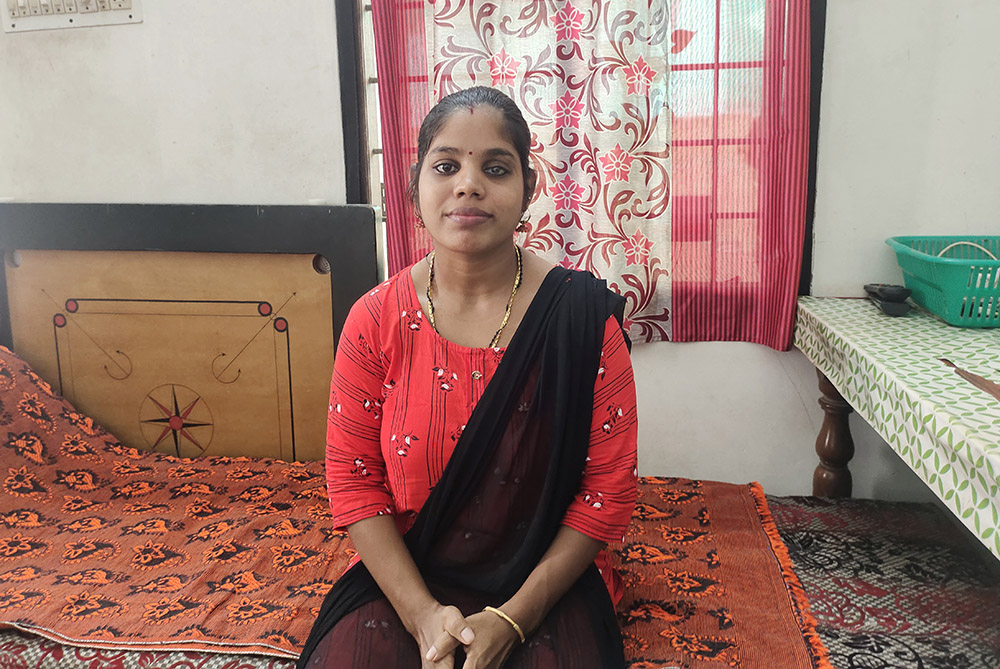
Reena, who inspired the foundation of Homes of Hope, at her new home in Fort Kochi, Kerala (Thomas Scaria)
Reena, who now lives in the Fort Kochi area, said she would have ended up in the streets as a hopeless beggar or a shattered woman if she had not met the nuns.
"I am not alone, almost all of my batch-mates in Pratyasha Bhavan are married and leading a family life," she told GSR as her husband and mother-in-law stood by her side.

